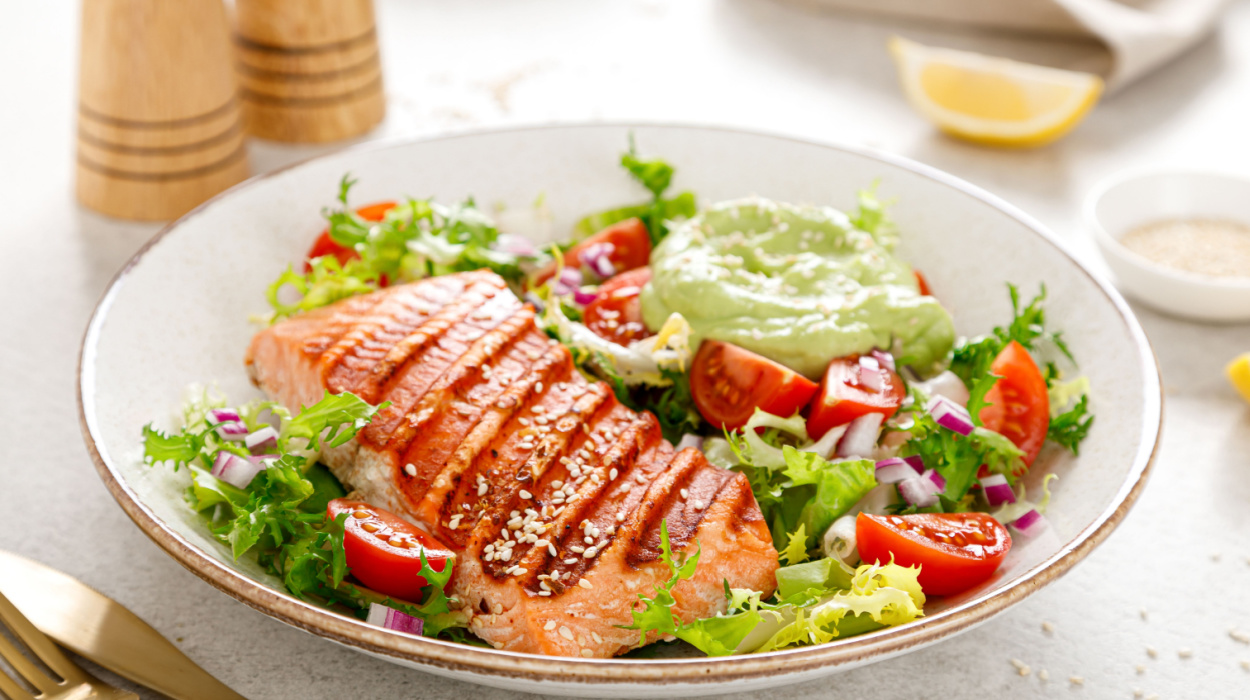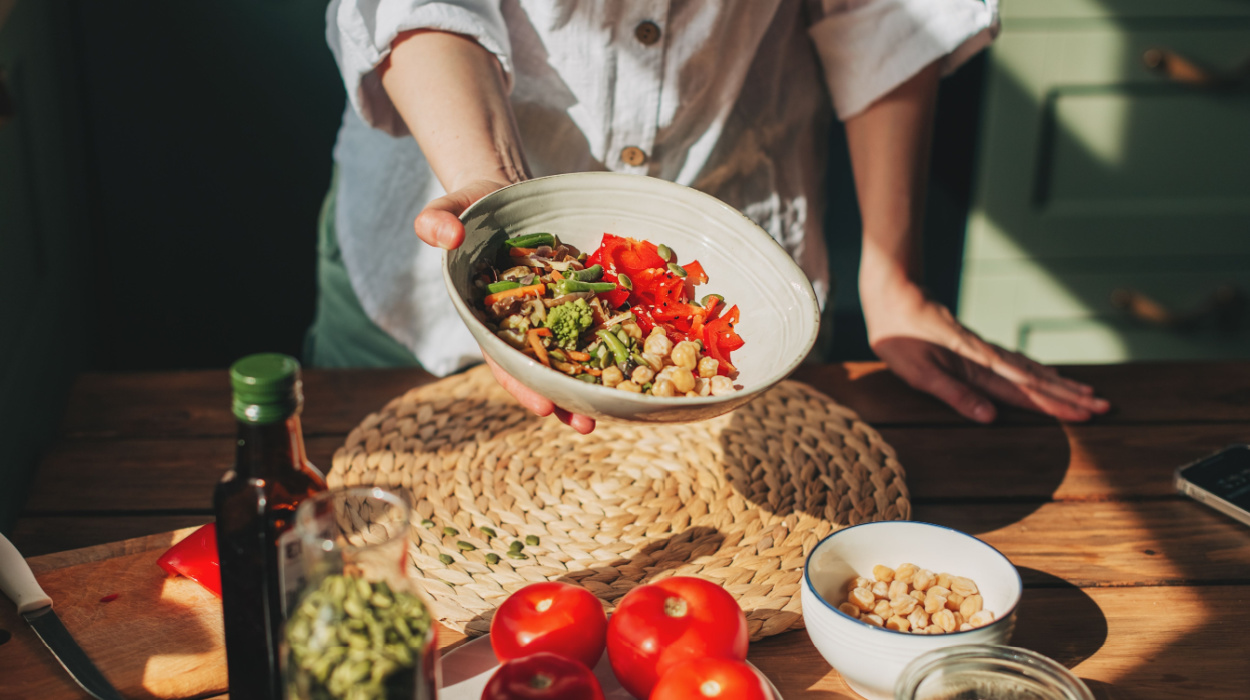 Evidence Based
Evidence Based
Evidence Based
This article is objectively based on relevant scientific literature, written by experienced medical writers, and fact-checked by a team of degreed medical experts.
Our team of registered dietitian nutritionists and licensed medical professionals seek to remain objective and unbiased while preserving the integrity of any scientific debate.
The articles contain evidence-based references from approved scientific sites. The numbers* in parentheses (*1,2,3) will take you to clickable links to our reputable sources.
Gastric Sleeve Diet: What To Eat, Avoid, Diet Plan & Tips 2024

Gastric sleeve, or sleeve gastrectomy, is a popular surgery that can help you lose excess weight and improve your overall health. This procedure removes a portion of the stomach to reduce food intake and decrease hunger. The procedure itself, though, is not a silver bullet to healthy weight loss. You must also follow dietary guidelines pre and post-gastric sleeve surgery to ensure the best possible outcomes.
You can reach your desired weight loss goals safely and effectively by following a specialized gastric sleeve diet plan, plus tips and guidelines on what low-calorie foods to eat and avoid. It can all seem a little overwhelming, so we have condensed all that information for you into this handy guide!
Gastric Sleeve Meal Plan
Discover the versatility and nutrition-packed choices within our comprehensive gastric sleeve diet plan, designed to provide delicious and satisfying meals while adhering to the dietary guidelines essential for post-surgery success.
- Breakfast: Protein-Packed Morning Delight
- Lunch: Lean Green Salad
- Snack: Nutrient-Packed Nibbles
- Dinner: Healthy Protein and Veggie Feast
- Dessert: Berry Bliss
Gastric Sleeve Diet Plan
Once you have passed the liquid diet and pureed foods stage of your post-surgery journey, it is time to reintroduce solid foods. This sample diet plan is designed for at least six to eight weeks post-surgery once your bariatric team has given you the all-clear to reintroduce solid foods to your diet. Soft foods may, of course, still be eaten!
Bariatric Surgery Meal Ideas:
Breakfast: Protein-Packed Morning Delight (Approx. 400 Calories)
Start the day with a balanced breakfast that includes a good source of protein, such as Greek yogurt or eggs. Add some fresh fruit and a whole grain like oatmeal or toast for fiber. You could also opt for a smoothie with some protein powder.
| Breakfast | |
| Scrambled eggs | Two |
| Herbs (e.g., parsley, chives) | One tablespoon |
| Garlic | One clove |
| Vegetables (e.g., bell peppers, spinach) | One half cup |
| Toast | Two slices |
| Green tea | One cup |
Lunch: Lean Green Salad (Approx. 400 Calories)
Choose something light, like a salad with leafy greens; add some fibrous vegetables such as tomatoes and cucumbers, and top it off with a lean protein, such as grilled chicken or tuna. Make sure to use a minimal amount of dressing to keep calories down. A piece of fresh fruit can be added as well.
| Lunch | |
| Leafy greens (lettuce, spinach, or arugula) | Two cups |
| Cherry tomatoes | One half cup |
| Cucumbers | One half cup |
| Grilled chicken breast or canned tuna | Four oz |
| Light vinaigrette dressing (use sparingly) | One tablespoon |
| Fresh fruit (e.g., apple or orange) | One medium |
Snack: Nutrient-Packed Nibbles (Approx. 393 Calories)
Nuts are an excellent snack option because they contain monounsaturated fatty acids, which help regulate appetite hormones. Other snacks could include string cheese or hard-boiled eggs.
| Snack | |
| Mixed nuts | One oz |
| String cheese | One stick |
| Hard-boiled eggs | Two |
Dinner: Healthy Protein and Veggie Feast (Approx. 1200 Calories)
Fill plates with lean proteins such as fish, chicken, or tofu and non-starchy vegetables like broccoli, spinach, or Brussels sprouts cooked in olive oil.
| Dinner | |
| Grilled or baked salmon | Six oz |
| Steamed broccoli | One cup |
| Sautéed spinach with olive oil | One cup |
| Lemon juice | Two oz |
Dessert: Berry Bliss (Approx. 205 Calories)
Choose low-calorie options like fresh fruit with a sprinkle of cinnamon or Greek yogurt topped with berries for dessert to satisfy sweet cravings without overindulging in unhealthy treats.
| Dessert | |
| Fresh mixed berries (strawberries, blueberries, raspberries) | One half cup |
| Cinnamon | One quarter teaspoon |
| Greek yogurt | Six oz |
| Mixed berries (strawberries, blueberries, raspberries) | One half cup |
What Is A Gastric Sleeve Surgery?
A gastric sleeve surgery is a type of weight loss surgery that helps people who struggle with obesity to reduce their daily caloric intake. A surgeon removes up to[1] two-thirds of your stomach during the procedure and seals off the remaining portion. This leaves you with a smaller stomach shaped like a sleeve or tube and is only about the size of a banana, which facilitates early satiety, alters hunger hormones, and reduces appetite so you can lose weight faster and easier.
Both pre and post-surgery, you are encouraged to follow a healthier lifestyle and consider nutritional supplementation. Some gastric sleeve procedures, such as a single-anastomosis duodenal-ileal bypass with sleeve gastrectomy,[2] will mean less ability to consume nutrients from food, as it not only reduces the amount of hydrochloric acid and intrinsic factor[3] available for digestion but bypasses a part of the small intestine where nutrients are absorbed.
When all guidelines are followed, surgery patients can expect to lose at least 50%[4] of their excess weight, though a percentage do not reach this goal over the long term.
Aside from the gastric sleeve, other kinds of bariatric surgeries[5] are designed for weight loss and improved health outcomes, such as gastric bypass and lap band surgery. Every individual’s case is different, so it’s best to consult a doctor before deciding which type of bariatric procedure is right for you.
Foods To Eat On A Gastric Sleeve Diet

Gastric sleeve patients need to be aware of the dietary changes that come with bariatric surgery.[6] Patients will usually follow a gastric sleeve pre-op diet. A gastric sleeve liquid diet pre-op is unnecessary, but there will be a two-week liquid diet phase post-op. The dietary recommendations at every step are designed to help you lose and keep weight off. Foods recommended for a gastric sleeve diet include lean proteins, low-fat dairy, fruits, vegetables, and whole grains.
Eating smaller meals more frequently[7] can also help control hunger and cravings. Avoid processed, refined and sugary foods along with high-fat meats. Consider that you will need supplementation for the rest of your life, even if you change your lifestyle for the better.
As your new stomach will not be able to absorb food as it used to, it could benefit from gut and digestive healing foods, such as yogurt and bone broth, or even gut and digestive healing supplements.
In addition to eating the right types of food, drinking water is essential for gastric sleeve patients, and sixty-four ounces of fluid per day is recommended. Staying hydrated helps keep you feeling full and promotes better digestion. A diet rich in protein[8] can also help preserve lean body mass during weight loss, so make sure to include some in each meal.
Finally, be patient with yourself during the process of changing your diet. Learning to eat healthier takes time, and most people make mistakes along the way. Working with your bariatric nutrition team for support as you transition to your new lifestyle is crucial.
Gastric Sleeve Meal Size And Frequency
Smaller meal sizes are important after gastric sleeve surgery. Eating larger meals can stretch the stomach and cause discomfort along with the possibility of tearing your surgical stitches, leading to internal bleeding and the need for revision surgery. Instead, eating five to six small meals throughout the day[6] or two larger meals with two snacks in between is recommended.
Foods should be soft and moist and should not require much chewing. Nutrient-dense foods such as lean proteins, fruits, and vegetables are best for gastric sleeve patients. Eating a balanced diet with supplementation helps ensure you get all the important vitamins and minerals your body needs.
Should I Follow A Gastric Sleeve Liquid Diet?
Gastric sleeve patients must follow a liquid diet for two weeks (avoiding caffeine and sugar substitutes) after the procedure. It is a strict diet, and during this time, the body is healing and adjusting, so it is vital to give it the nutrients it needs without stressing the new stomach anatomy. Pureed foods such as yogurt, oatmeal, and soups can be eaten during this post-surgical window, but not solid foods.
After a few weeks of pureed food and with your doctor’s permission, you may add soft foods. About eight weeks post-op, you can progress to firmer foods than your soft diet allows and start incorporating more fiber into your diet.
Foods To Avoid
Foods to avoid on a post-surgery gastric sleeve diet plan after your liquid and pureed diets include high-fat dairy products, fried foods, carbonated beverages, fruit juice, rice, pasta, and processed meats. Rice and pasta are avoided because of their starch content they tend to form a paste in the digestive tract making it difficult to swallow without liquids. You should also try to steer clear of high-calorie snacks like candy bars or chips. You only have a small amount of stomach left; best not to waste it on junk food!
Eating large portions of food after gastric sleeve surgery can lead to dumping syndrome, in which the body reacts unpleasantly when too much food is consumed at once. Drinking alcohol can also cause dumping syndrome, so it is best to avoid or limit your intake of alcoholic beverages and be sure to eat slowly.
In general, a balanced diet for gastric sleeve patients should include plenty of lean proteins, fresh fruits and vegetables, whole grains, and healthy fats like nuts, seeds, and avocado, along with supplementation of critical nutrients such as vitamin B12, iron, calcium, and vitamin D.
What Is Dumping Syndrome?
Dumping syndrome is a condition that occurs when food, especially sugar, moves too quickly from the stomach to the small intestine.[9] It can cause nausea, vomiting, abdominal cramps, bloating, dizziness or lightheadedness, feeling overly full or tired after eating, and even diarrhea. Gastric sleeves reduce the stomach size, making dumping syndrome more likely.
Tips To Eat On A Gastric Sleeve Diet

In addition to your healthy new diet, there are some things you should do to aid the digestion of your food.
- Eat slowly and chew food thoroughly to aid digestion.
- Avoid carbonated beverages.
- Drink plenty of fluids between meals, but not with them, as they can fill you up too quickly.
- Aim for three small meals and two snacks per day instead of large meals, as this will help control hunger levels and ensure you’re getting enough nutrition.
The Importance Of Taking Supplements Pre And Post Surgery
Supplementation after bariatric surgery is paramount for successful weight loss and health maintenance. Without adequate supplementation, patients may suffer from nutrient deficiencies,[10] leading to serious long-term health problems such as anemia, osteoporosis, increased risk of infection, hair loss, and fatigue.
Supplements are generally composed of multivitamins and individual vitamins and minerals that have been shown to be deficient in post-bariatric surgery patients.
Supplement Dosages
The recommended dietary intakes of certain nutrients may not apply to sleeve gastrectomy patients; for example, gastrectomy patients need 1,200-1,500 milligrams of calcium after surgery, whereas the RDI is 1,000-1,200 mg, depending on your sex. Furthermore, to enhance absorption, calcium citrate supplementation is recommended to be taken three times a day as opposed to once and should not be taken at the same time as iron supplements. Hence, the importance of consulting a registered dietitian for your supplement regimen is crucial.
Individual supplements such as B12 should be supplemented sublingually or by injection since its absorption in the stomach is impaired from the lack of intrinsic factor, a protein produced in the stomach that binds to B12 to enable absorption. If taken orally, administer 500 micrograms daily.
Supplement Options
In addition to ensuring adequate nutrition levels after bariatric surgery, supplementation also helps reduce cravings for unhealthy foods that could counter the positive effects of the surgery. Vitamins should be chewable or liquid for the first several months after surgery.
The main nutrients affected by gastric sleeve surgery are iron, B12, calcium, and vitamin D. These may need to be supplemented for life[10] due to reduced gastric acid, which helps to break down nutrients, and reduced intrinsic factor, which is important for the uptake of B12.
Final Thought
Gastric sleeve surgery, other forms of bariatric surgery, and post-op dietary requirements are effective weight loss interventions that require careful planning and monitoring. To maximize the benefits of this diet, it’s important to create a meal plan that consists of balanced meals with nutrient-dense foods like vegetables, fruits, whole grains, lean proteins, and healthy fats and follow a supplementation regime.
Additionally, drinking plenty of water throughout the day and avoiding sugary drinks can help you to stay hydrated and reduce sugar and hunger cravings. Keeping track of progress with your bariatric nutrition team and adjusting the diet when necessary is essential for long-term success.
+ 10 sources
Health Canal avoids using tertiary references. We have strict sourcing guidelines and rely on peer-reviewed studies, academic researches from medical associations and institutions. To ensure the accuracy of articles in Health Canal, you can read more about the editorial process here
- Brajcich, B.C. and Hungness, E.S. (2020). Sleeve Gastrectomy. JAMA, [online] 324(9), p.908. doi:https://doi.org/10.1001/jama.2020.14775.
- Andrés Sánchez‐Pernaute, Rubio, M.A., Natàlia Ferré, Rodrı́guezC., Marcuello, C., C. Pañella, L López Antoñanzas, Torres, A. and Pérez-Aguirre, E. (2022). Long-Term Results of Single-Anastomosis Duodeno-ileal Bypass with Sleeve Gastrectomy (SADI-S). Obesity Surgery, [online] 32(3), pp.682–689. doi:https://doi.org/10.1007/s11695-021-05879-9.
- Kines, K. and Krupczak, T. (2016). Nutritional Interventions for Gastroesophageal Reflux, Irritable Bowel Syndrome, and Hypochlorhydria: A Case Report. Integrative medicine (Encinitas, Calif.), [online] 15(4), pp.49–53. Available at: https://www.ncbi.nlm.nih.gov/pmc/articles/PMC4991651/
- Cadena-Obando, D., Ramírez‐Rentería, C., Ferreira‐Hermosillo, A., Albarrán‐Sánchez, A., Sosa-Eroza, E., Molina-Ayala, M. and Etual Espinosa-Cárdenas (2020). Are there really any predictive factors for a successful weight loss after bariatric surgery? BMC Endocrine Disorders, [online] 20(1). doi:https://doi.org/10.1186/s12902-020-0499-4.
- Wolfe, B.M., Elizaveta Kvach and Eckel, R.H. (2016). Treatment of Obesity. Circulation Research, [online] 118(11), pp.1844–1855. doi:https://doi.org/10.1161/circresaha.116.307591.
- Bettini, S., Belligoli, A. and Fabris, R. (2020). Diet approach before and after bariatric surgery. Reviews in Endocrine and Metabolic Disorders, [online] 21(3), pp.297–306. doi:https://doi.org/10.1007/s11154-020-09571-8.
- Shiri Sherf-Dagan, Ariela Goldenshluger, Globus, I., Schweiger, C., Kessler, Y., Galit Kowen Sandbank, Tair Ben-Porat and Sinai, T. (2017). Nutritional Recommendations for Adult Bariatric Surgery Patients: Clinical Practice. Advances in Nutrition, [online] 8(2), pp.382–394. doi:https://doi.org/10.3945/an.116.014258.
- Carolina Ferreira Nicoletti, Gabriel Perri Esteves, Genário, R., Marco Aurélio Santo, Roberto de Cleva, Gualano, B. and Roschel, H. (2020). Nutritional Inadequacies Among Post-bariatric Patients During COVID-19 Quarantine in Sao Paulo, Brazil. Obesity Surgery, [online] 31(5), pp.2330–2334. doi:https://doi.org/10.1007/s11695-020-05107-w.
- Yasmin and Afrânio Côgo Destefani (2016). PATHOPHYSIOLOGY, DIAGNOSIS AND TREATMENTOF DUMPING SYNDROME AND ITS RELATION TO BARIATRIC SURGERY. ABCD, [online] 29(suppl 1), pp.116–119. doi:https://doi.org/10.1590/0102-6720201600s10028.
- Lupoli, R., Lembo, E., G. Saldalamacchia, Claudia Kesia Avola, Angrisani, L. and Capaldo, B. (2017). Bariatric surgery and long-term nutritional issues. World Journal of Diabetes, [online] 8(11), pp.464–464. doi:https://doi.org/10.4239/wjd.v8.i11.464.



